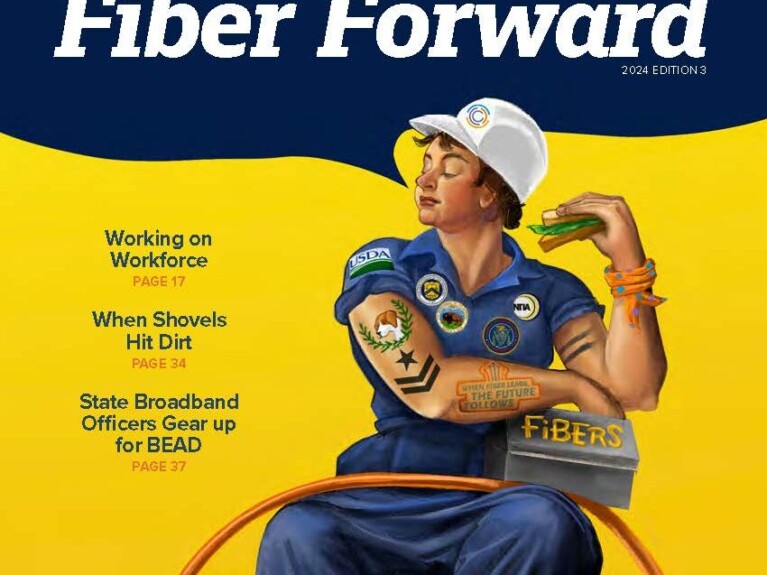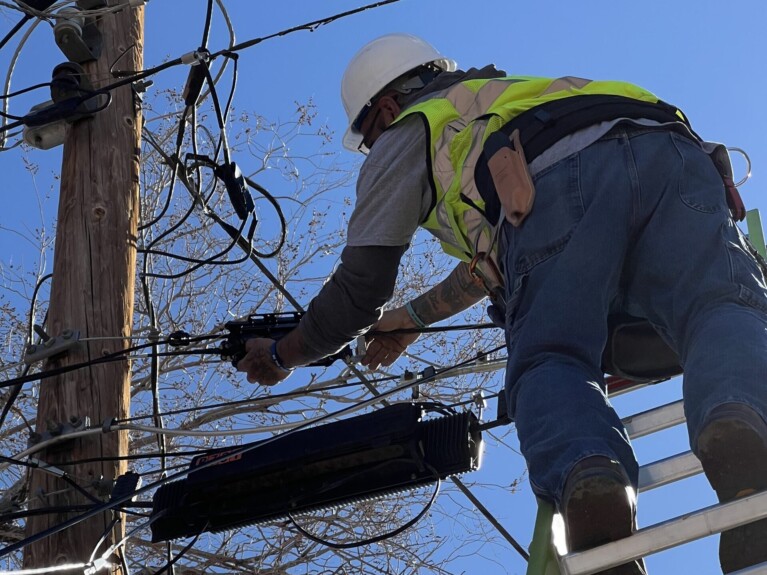Looking Back and Forth: FBA’s 2023 Accomplishments, 2024 Objectives
By nearly all measures, the Fiber Broadband Association saw significant progress and growth throughout 2023. Fiber broadband deployment set a new record during the year, passing 9 million new homes with growth of 13% year-over-year. A total of 77.9 million U.S. homes are passed with fiber, with 51.5% of our nation’s unique homes and businesses passed with fiber.
“We’re building out critical infrastructure for generations to come,” said Gary Bolton, President and CEO of the Fiber Broadband Association. “Continued growth and more record-setting progress is anticipated for 2024 as the $42.45 billion NTIA BEAD broadband infrastructure funding has started to flow, with NTIA approving Louisiana’s initial proposal on December 15, 2023. All states and territories were required to submit their initial proposals to NTIA by December 27, 2023, so we should expect to see a steady stream of NTIA approvals and BEAD funding authorizations across the nation in the first half of 2024.”
The supply side of fiber industry struggled in 2023 due to an excess of inventory built up from pandemic-related supply-chain challenges, noted Bolton, with FBA’s service provider survey finding that fiber and fiber-related equipment inventory peaked during the year with an average of nine months of stock on hand. “This inventory has been drawn down in the second half of 2023, with passive products having the lowest level of stock on hand, followed by electronics and fiber cable, which still have a way to go,” said Bolton. “FBA estimates that fiber-related inventory will normalize during the first half of 2024.”
As the industry continues to add new homes, the Association has continued to add new members to its membership and new participants to its annual Fiber Connect industry conference. “FBA’s membership has grown 108% over the past three years, and we added over 46 net new member companies since our Premier Members Meeting in December 2022,” stated Bolton. “We are excited to report that in 2023, we also added 27 Federally Recognized Tribal Organizations as members thanks to FBA’s Tribal working group co-chairs, Robert Griffin and Sachin Gupta, and FBA’s membership team.”
FBA closed out the year with 470 members companies, with network operators making up 48%. “We’ve added 50 member companies this year,” said Bolton. “We try to be about 51% network operators, so we’re a little bit behind on that.”
Person-to-person engagement through FBA events continues to be an ongoing, growing, and successful activity. “A major highlight of 2023 was FBA’s annual Fiber Connect conference held in Orlando, Florida, beating 2022’s record attendance by 33%,” said Bolton “Fiber Connect 2024 will be held in Nashville, Tennessee, from July 28 to July 31, and we anticipate another record turnout.” The 2024 exhibit hall has sold out nearly a year in advance, with the conference planning team working hard on next year’s agenda, he noted.
Other events, such as the Regional Fiber Connect workshops and the Premier Members Meeting, were also well received. “Minneapolis was our second-strongest regional event of the year, successfully exceeding all of our success metrics for the event,” said Bolton. “The 2023 Premier Members Meeting in Palm Springs, on December 5-6, was our best to date with our largest premier member turnout, the strongest field of candidates that participated in the board elections, the strongest agenda of top industry speakers, and a world-class venue.”
Among the priorities for FBA in 2023 were workforce development and increased legislative engagement. FBA is currently working with 40 states, 44 service providers, and 70 community colleges and training institutions to roll out the Optical Telecom Installer Certification (OpTIC Path™) fiber optic technician training program.
“Job Corps has selected FBA’s OpTIC Path program,” said Bolton “With more than 120 campuses across the United States, Job Corps is expected to become the second-largest producer of OpTIC Path graduates, helping to develop the technical workforce needed to connect every community to fiber broadband networks. Further, the state of Vermont has also recently signed a training contract with FBA.”
FBA’s advocacy efforts continue to gain traction under the leadership of Marissa Mitrovich, FBA’s Vice President of Public Policy, along with FBA’s Chief Regulatory and Legal Counsel, Tom Cohen, and FBA’s Washington DC lobbyist, Crystal Tully, with Wiley Rein. FBA’s public policy committee has grown to 113 members, up 119% year-over-year. During the fourth quarter, FBA held numerous events and meetings on Capitol Hill, including a DC fly-in meeting with 12 Congressional offices, the first “Fiber on the Hill” day, and ongoing engagement with Congress.
“FBA is also very active and has filed comments on the FCC’s Section 706 Notice of Inquiry on broadband speed thresholds, the FCC Title II proceeding, and has been actively engaged in advocacy initiatives before Congress and the Administration to promote the continued funding of the FCC Affordable Connectivity Program (ACP) and on permitting reform,” said Bolton. “Marissa and the policy team are currently in the process of planning our next Fiber Day on the Hill, which is scheduled for April 11, 2024.”
The Fiber Broadband Association continues to put a hard focus on research and produced several new studies and reports in 2023:
- “The State of The North American Fiber Industry” (FBA/RVA) reveals that fiber has been deployed to 77.9 million homes as of December 2023, growing 13% year-over-year.
- “Fiber Deployment Annual Cost Study” (FBA/Cartesian) finds that costs for aerial deployments range from $4 to $9 per foot and buried costs range from $11.30 to $24.13 per foot. This report includes detailed fiber deployment cost elements.
- “Trusted Fiber” (FBA Trusted Fiber Working Group) which outlines key policy recommendations to ensure fiber deployed in the U.S. comes from trusted and ethical sources.
In addition, the new annual “Fiber Deployment Cost” study was prepared in 2023 and released in January 2024.
Onward to 2024
“As FBA heads into 2024, the Association remains in an exceptionally strong position to execute our mission, benefiting generations to come,” said Bolton. “NTIA BEAD funding is starting to flow, and we expect deployments from this funding to begin in the second half of 2024. In the interim, broadband funding continues with a number of state and federal programs, such as the FCC’s Rural Digital Opportunity Fund (RDOF), USDA’s Reconnect broadband funding, the U.S. Department of Treasury’s $10B Corona Virus Capital Projects Fund (CPF), to mention a few. As noted earlier, we also believe that service provider inventory will continue to draw down in the first half of 2024, returning the supply side of our industry to normalized and healthy revenue run rates.”
One vision is driving FBA priorities this year. “We want to focus on elevating quality of life for generations to come,” said Bolton. “We want to make sure fiber is going to translate into changing the world as we know it. That happens by having critical fiber infrastructure available for everyone, paving the way for next-generation advances such as quantum networking, quantum computing, generative AI, Metaverse, and so forth.
“The payoff and return on investments are multifold. You start with improved health care, detecting cancer earlier, treating and curing chronic conditions. Being able to have economic growth, development, and opportunities across all communities, including equitable access to education. Smart grids, microgrids, renewable energy are all tied together with fiber and getting to a zero carbon footprint, and it’s going to pave the way for things like autonomous vehicles and trucking.”
Bolton outlined five FBA priorities for 2024:
1) Fiber is Critical Infrastructure
Deploying broadband is not about meeting minimum requirements or a “good enough” standard that needs recapitalization every three to five years but providing a long-lasting multi-generational infrastructure solution.
2) Accelerating Deployment
Speed of deployment is a critical characteristic and challenge. Anything that slows down builds will result in driving up cost and lowering efficiency. Streamlining permitting and utility locates is paramount to avoid delays. Finally, supply chains must be properly managed to prevent disruptions.
3) Protect Our Nation’s Critical Broadband Infrastructure
In 2023, FBA completed its Trusted Fiber 1.0 white paper. It is now working with policymakers to promote these important ideas that will play a key role in protecting our nation’s vital communications networks.
4) Workforce Development
Last year, FBA developed a Broadband Workforce Development Guidebook that was distributed to every state broadband office and workforce development office across the nation. To date, FBA has hosted over a dozen “Train the Trainer” sessions to help communities launch their own programs.
FBA is continuing to roll out its OpTIC Path fiber technician training program to community colleges and learning institutions in every state in the nation.
5) Adoption and Affordability
As FBA members connect homes across the nation with fiber, the Association must ensure everyone is able to participate in our digital future.
To accomplish these objectives, FBA will continue to support its committees and build upon the success of its events. “We’ve grown to 16 committees now,” said Bolton. “Committees provide a great way for getting more people involved with the issues they are passionate about. They’re all volunteer-organized and led.”
Fiber Connect 2024, taking place on July 28-31, 2024, has already sold out all of its exhibit space. “We anticipate over 4,000 attendees,” said Bolton. “The Conference Committee is working hard to create and deliver the content people want and need in Nashville.”
Regional Fiber Connect workshops will continue in 2024 in five new cities, including Richmond, Va., in February; Little Rock, Ark., in April; Deer Valley, Utah, in June; Des Moines, Iowa, in September; and Albuquerque, N.M., in November. Unlike the large Fiber Connect annual conference, regional workshop attendees are generally not familiar with FBA, and it is their first FBA event. Regional Fiber Connect events provide an opportunity for FBA and participating sponsors to engage with these attendees who are seeking to learn about fiber broadband and how to connect their communities.
Bolton warned that FBA couldn’t become complacent in its advocacy, despite the forward progress of BEAD. In December 2023, the FCC upheld its decision to deny Starlink its $885 million RDOF award on a 3 to 2 vote margin along party lines.
“One vote going in the wrong direction could result in digital redlining, preventing large regional areas of the Midwest and Pacific Northwest from being eligible for fiber funding that can elevate the quality of life for generations to come,” Bolton said. “We can never let our guard down. The threat to our mission is constant, so FBA must remain vigilant in our advocacy and educational efforts. Many of us have been working our entire careers for this historic opportunity to build out our nation’s critical broadband infrastructure.”






